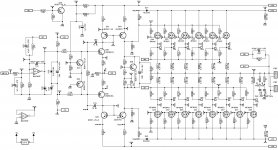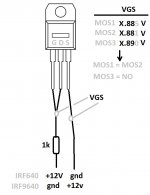He has a single fet that shorts out internally, but it is random which one that fails and it does so at low power constant driver into a resistive load. And only the N side of the output stage. The P side is AOK every time so far.
We have been waiting for a new batch of fets to get in so he could try another source and brand of fet to see if he has been a victim of counterfeit devices at this point.
He says all of the normal things like gate resistors and what not are checked and Ok and the amp is stable and not oscillating by way of a O-scope check..
We have been waiting for a new batch of fets to get in so he could try another source and brand of fet to see if he has been a victim of counterfeit devices at this point.
He says all of the normal things like gate resistors and what not are checked and Ok and the amp is stable and not oscillating by way of a O-scope check..
thanks, but i have read the thread.. . i missed the part were he said their shortened, though. does that mean drain-sourse is a dead short? or is it gate-sourse?
. i missed the part were he said their shortened, though. does that mean drain-sourse is a dead short? or is it gate-sourse?
i have much interest in this as i'm in the progress of building an lme49830 amp using those fet's..(inc 640N )
)
guy
i have much interest in this as i'm in the progress of building an lme49830 amp using those fet's..(inc 640N
guy
Its unusual for just one side to go.
Once the n-channel is short it puts a huge strain on the other side and usually takes out both p and n channel fets. Perhaps the fuse is blowing before the p channel goes as well ?
I would be looking at the bias circuit to ensure it has correct bias as this will keep on wiping out output fets if it is wrong.
Once the n-channel is short it puts a huge strain on the other side and usually takes out both p and n channel fets. Perhaps the fuse is blowing before the p channel goes as well ?
I would be looking at the bias circuit to ensure it has correct bias as this will keep on wiping out output fets if it is wrong.
sorry sorry sorry!
i haven't received the notifications

 i don't know why for this 3d...and not for other
i don't know why for this 3d...and not for other
well well.
<<previously on Pergo's channel>>
i bought IRF640 original from ST...IRF640 not N version
same failure.
i desoldered all gate resistor and other resistor beside in the pictures...
all have the correct value
Then..a little demotivated, i left it apart for a while, because arrives other amplifier in my lab, to fix them.
I hope, in few days, to change the driver section with 2SA1837 + 2SC4793.
As i said before:
if it will fail, the only options are the drivers...but, if i want replace them, i've to buy some substitutes... Drivers are: http://www.datasheetcatalog.org/data.../240361_DS.pdf
Can i use 2SA1837 + 2SC4793??? Hfe is similar, those have higher Vceo but less Ic (1A vs 1.5A). Same pinout. They are drivers from Audison HV16
I hate SMD layout. Ok, it's awesome to view...but very very difficult to fix the not-easy problems like that!
If there's is a failure in control circuit...it's impossibile to understand the wiring.
About the type of failure. i don't remember if fails gate-drain or drain-source. sorry
But...if the next test will fail....i will know
The problem isn't the bias: now i'm at minimum. But same failure gets at medium or high bias...
i haven't received the notifications
well well.
<<previously on Pergo's channel>>
i bought IRF640 original from ST...IRF640 not N version
same failure.
i desoldered all gate resistor and other resistor beside in the pictures...
all have the correct value
Then..a little demotivated, i left it apart for a while, because arrives other amplifier in my lab, to fix them.
I hope, in few days, to change the driver section with 2SA1837 + 2SC4793.
As i said before:
if it will fail, the only options are the drivers...but, if i want replace them, i've to buy some substitutes... Drivers are: http://www.datasheetcatalog.org/data.../240361_DS.pdf
Can i use 2SA1837 + 2SC4793??? Hfe is similar, those have higher Vceo but less Ic (1A vs 1.5A). Same pinout. They are drivers from Audison HV16
I hate SMD layout. Ok, it's awesome to view...but very very difficult to fix the not-easy problems like that!
If there's is a failure in control circuit...it's impossibile to understand the wiring.
About the type of failure. i don't remember if fails gate-drain or drain-source. sorry
But...if the next test will fail....i will know
The problem isn't the bias: now i'm at minimum. But same failure gets at medium or high bias...
when it sound (for 5 minutes) in my friend's car @1ohm with ReAudio, it goes well. Deep bass, very powerful and controlled.
But after 5 minutes..protection then, protection confirms outputs N stage fails.
then, protection confirms outputs N stage fails.
Before protection: no heat, no distortion...nothing.
Amperometer said there's a little increase of current, some fraction of second before failure. I think it's normal because without protection, i'll blow the fuse or the power supply.
The amplifier makes no differences between 4ohm 2ohm or 1ohm, or 20w, 200w or 900w......it will fail after small times.
it works only at idle, or with dummy load but with no signal applied.
over 10w....it will fail.
But after 5 minutes..protection
Before protection: no heat, no distortion...nothing.
Amperometer said there's a little increase of current, some fraction of second before failure. I think it's normal because without protection, i'll blow the fuse or the power supply.
The amplifier makes no differences between 4ohm 2ohm or 1ohm, or 20w, 200w or 900w......it will fail after small times.
it works only at idle, or with dummy load but with no signal applied.
over 10w....it will fail.
When you use paralleled output mosfets it is imperative they are identical devices (usually the same production date code should do fine, no need to sort them). Is it possible that you are using output FEts that open at different gate voltages, thus the device that opens first will sustain all the load causing it to fail?
I don't think that's the problem. All 6 fets where replaced all from same production date. When one fails under test I replace it with same batch as the rest. Then I try to replace all 6 fets when 1 failed but still the problem continues.
My problem is exactly as the OP's.
Im going to change out the drivers and try again. Even though they test ok, I'm at a dead end with this amp. I have 2 lrx400.1's, both same fault.
My problem is exactly as the OP's.
Im going to change out the drivers and try again. Even though they test ok, I'm at a dead end with this amp. I have 2 lrx400.1's, both same fault.
When you use paralleled output mosfets it is imperative they are identical devices (usually the same production date code should do fine, no need to sort them). Is it possible that you are using output FEts that open at different gate voltages, thus the device that opens first will sustain all the load causing it to fail?
If you have source resistors they should help balance out any problems.
I usually use 0.22R. If smaller than that is used then that might cause a problem.
Hi, I hope you are testing Lrx with pcb properly mounted on heatsink, with good clamps.
When you have AB class MOSFET amp, mosfets all P and all N must be selected, matched, and doesn't matter if N are selected differently from P mosfet
Mosfet with lower vgs and a greater transconductance S, is the one that delivers more current, dissipating more power and therefore breaking itself.
In factory they manually select mosfet, but there is a trick to match mosfet in audio application: see picture
Try to match similar value of vgs, very close, same value is not possible otherwise you need many mosfet to do this
I repeat: doesn't matter if N are selected differently from P mosfet, for example all N mosfet VGS= 3.16V and all P mosfet VGS= 2.45V
After replacing mosfet, pcb on hetsink, then connect sinusoidal signal, half power, 4 Ohm load, then measure mVDC across 0.15 Ohm (medium value of output current)
of each mos, for example, IRF640: you may have some value near zero but this is not a problem, the problem is when you have ONLY ONE output current much greater then the others.
Ciao.


When you have AB class MOSFET amp, mosfets all P and all N must be selected, matched, and doesn't matter if N are selected differently from P mosfet
Mosfet with lower vgs and a greater transconductance S, is the one that delivers more current, dissipating more power and therefore breaking itself.
In factory they manually select mosfet, but there is a trick to match mosfet in audio application: see picture
Try to match similar value of vgs, very close, same value is not possible otherwise you need many mosfet to do this
I repeat: doesn't matter if N are selected differently from P mosfet, for example all N mosfet VGS= 3.16V and all P mosfet VGS= 2.45V
After replacing mosfet, pcb on hetsink, then connect sinusoidal signal, half power, 4 Ohm load, then measure mVDC across 0.15 Ohm (medium value of output current)
of each mos, for example, IRF640: you may have some value near zero but this is not a problem, the problem is when you have ONLY ONE output current much greater then the others.
Ciao.


- Status
- This old topic is closed. If you want to reopen this topic, contact a moderator using the "Report Post" button.
- Home
- General Interest
- Car Audio
- Audison eats output N mosfet..why?